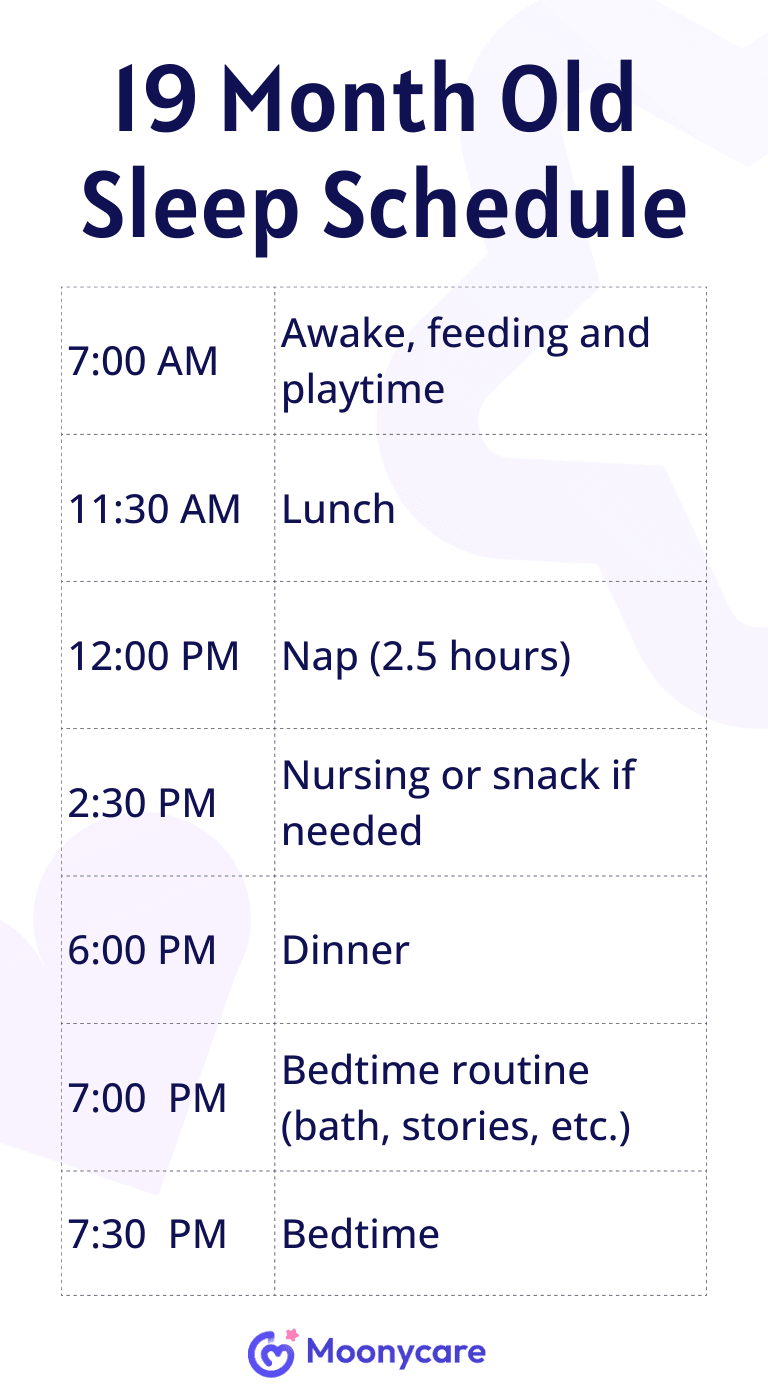

By the time your child reaches 19 months, sleep becomes a critical part of their daily routine, impacting not just their growth but also their mood, energy levels, and overall health. Understanding and establishing a consistent sleep schedule can significantly contribute to a peaceful environment for both your toddler and the rest of the family. As your toddler grows, their sleep needs evolve, necessitating adjustments in both naptime and bedtime routines. This article will explore what you need to know about your 19-month-old's sleep schedule, providing practical insights to help you navigate this phase with confidence.
IN THIS ARTICLE:
What are Wake Windows for a 19 Month Old?
A Sample Sleep Schedule for 19 Month Old Babies
How Much Should a 19 Month Old Sleep?
How Long Should a 19 Month Old Nap?
How Many Naps are Suitable for a 19 Month Old?
What Time Should a 19-Month-Old Go to Bed?
Can a 19-Month-Old Baby Sleep Through the Night?
Can you Sleep Train a 19-Month-Old?
Is there Sleep Regression for 19 Month Old Babies?
What are Wake Windows for a 19-Month-Old?
At 19 months, toddlers are gradually moving towards longer periods of wakefulness between sleep sessions. Typically, the wake window at this age is about 4-6 hours. This means that after waking in the morning, your toddler can stay awake for approximately 5 to 6 hours before needing a nap. Accordingly, after their nap, they should be able to remain active for about 4-5 hours before bedtime. It's essential to observe your child's cues and tailor their wake windows to suit their individual needs. Some signs that your child is ready for sleep include rubbing their eyes, yawning, or becoming unusually fussy.
Sample 19-Month-Old Sleep Schedule
Given that most 19-month-olds have transitioned to just one nap per day, here's a sample schedule that might work well:

Remember that every baby is different, you don't have the follow a same schedule strictly.
How Much Should a 19-Month-Old Sleep?
At 19 months, toddlers generally require about 12-14 hours of sleep per day, including both nighttime sleep and their daily nap. Most toddlers will sleep for around 10-12 hours at night, coupled with some nap time during the day. Ensuring your child gets enough sleep is crucial for their physical development, cognitive growth, and emotional well-being. Conversely, lack of adequate sleep can lead to increased irritability, difficulty in concentrating, and other behavioral issues.
How Long Should a 19-Month-Old Nap?
The average nap duration for a 19-month-old is approximately 2.5 to 3 hours. This single nap usually occurs in the early afternoon, around midday. It's important to allow your child to nap for as long as they need during this time, as this helps them recharge and prepares them for the rest of the day. However, it's also crucial to ensure that the nap doesn't stretch too late into the afternoon, as this can interfere with their bedtime routine.
How Many Naps are Expected for a 19-Month-Old?
By 19 months, the vast majority of toddlers have transitioned to just one nap per day. While some children may still occasionally take two naps, this is increasingly rare as they get closer to two years old. The transition to a single nap can be challenging for some toddlers, but maintaining a consistent schedule and observing their cues can help ease this transition.
What Time Should a 19-Month-Old Go to Bed?
A consistent bedtime is key to ensuring your toddler gets enough sleep. Most 19-month-olds should go to bed between 7:00 and 8:00 PM. This timing allows them to get a full night's rest while fitting in their afternoon nap without disrupting their overall sleep pattern. To make it easier for your baby to fall asleep, you can build a bedtime routine that includes calming activities like a bath, reading a book, or gentle music, helping signal to your child that it's time to wind down and prepare for sleep.
Can a 19-Month-Old Baby Sleep Through the Night?
Yes, most 19-month-olds are capable of sleeping through the night, usually for about 10-12 hours. However, it's not uncommon for some toddlers to still wake up occasionally. Night wakings at this age can occur for various reasons, including teething pain, hunger, discomfort, developmental milestones or even simply out of habit. Maybe your child's sleep environment can also lead to their wakefulness.
If your toddler wakes up at night, try to keep interactions minimal to avoid stimulating them, which may make it harder for them to fall back asleep on their own and can help reinforce the idea that nighttime is for sleeping. Additionally, ensuring their room is conducive to sleep and establishing a comforting bedtime routine can help reduce night wakings. If it becomes a recurring issue, it might be helpful to adjust their wake windows slightly to ensure they aren't too tired or not tired enough.
Sleep Train a 19-Month-Old
Sleep training at 19 months might involve reinforcing sleep habits that were previously established or making adjustments as your child's sleep needs change. Techniques such as the Ferber method, the chair method, or gentle sleep coaching can help guide your toddler to self-soothe and fall asleep independently. No matter which way you choose, stick to it with patience and it will make effects at final.
Sleep Regression of a 19-Month-Old
Around 19 months, some toddlers may experience a sleep regression. They might cannot fall asleep easily as usual, wake up frequently at night, or refuse to nap at daytime. These can be affected by cognitive development, and developmental milestones, such as language development or increased mobility. During this period, the most effective approach is to maintain a consistent sleep routine and be patient. By doing so, it can help your toddler navigate through the brief regression without significantly disrupting their overall sleep pattern.
19-Month-Old Sleep Tips
-
Create a Consistent Bedtime Routine: A predictable routine helps signal to your child that it's time to wind down.
-
Ensure a Comfortable Sleep Environment: A dark, cool, and quiet room can help your toddler sleep better.
-
Monitor Diet: Avoid sugary snacks or stimulating foods close to bedtime.
-
Watch for Sleep Cues: Observing signs of tiredness can help you adjust their schedule if necessary.
-
Reduce Separation Anxiety: To help alleviate this, ensure your child feels secure and comforted during their bedtime routine. Spend extra time with them before bed, engage in soothing activities, and consider introducing a comfort object like a stuffed animal or blanket.






